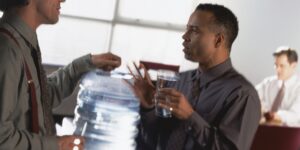
The arrival of cooler weather doesn’t eliminate the risk of heat illness for workers. California has been experiencing record-breaking temperatures, so the state’s Occupational Safety and Health Administration (Cal/OSHA) created new rules. These rules took effect on July 23, 2024. Their goal is to help prevent heat illness in indoor workplaces. These rules will start on July 23, 2024. They aim to help prevent heat illness in indoor workplaces.
These important safety measures apply to all indoor places. This includes restaurants, factories, and warehouses. These areas must have temperatures of 82ºF or higher when employees are present. Businesses must comply with these regulations to ensure the safety and well-being of their employees.
However, these rules do not apply to those working from home.
At RD Law Group, our top wrongful termination lawyers are dedicated to protecting the rights of California workers. If you believe your rights have been compromised, call us at 424-535-1500 for a free consultation.

To comply with the new regulations, employers must follow the listed compliance regulations below. California employee rights must be maintained for workplace safety. You can file a complaint if a workplace is unsafe and an employer creates a hostile work environment.
An employment lawyer in Los Angeles will know workplace laws and legal rights for employees. You can fight back if you are employed in California and your employer violates your rights.
Employers must ensure that all employees have access to fresh, cool drinking water throughout their workday to maintain health and well-being.
Employers are responsible for the following:
– Availability: Provide water at no cost in convenient locations within work areas.
- Quantity: If water isn’t supplied continuously through plumbing, ensure each employee has access to one quart of water per hour for their entire shift. Alternatively, supply smaller amounts initially and replenish as needed during the shift to maintain this availability.
- Encouragement: Actively encourage employees to drink water frequently to stay hydrated.
By adhering to these guidelines, employers can support a safe and healthy work environment.

To ensure the well-being of employees, employers must provide access to cool-down areas when workers are on site. These spaces should always be kept below 82ºF and be spacious enough to accommodate all employees enjoying their rest or meal breaks.
Key points to implement:
- Encouragement: Actively promote the use of these areas for preventative cool-down rests.
- Monitoring: Observe employees using the cool-down areas and check for any heat illness symptoms.
- Encouragement & Safety: Motivate employees to remain in the cool-down area if they experience discomfort.
- Ensure they are not required to return to work until any heat-related symptoms have subsided and they have spent a minimum of five minutes in the cool-down area.
Employers must establish clear emergency response procedures to protect employee health and safety.
These procedures should ensure employees can reach a supervisor or emergency medical services. Using cell phones for calls or texts in an emergency is acceptable if the area has reliable reception.
Key guidelines include:
- Responding to Heat Illness: Employees showing signs or symptoms of heat illness must be kept from being offered first aid or emergency medical services.
- Clear Communication: Ensure emergency responders receive clear and precise directions to the worksite.
These steps are vital in maintaining a safe work environment and ensuring the well-being of all employees.
Employers must provide comprehensive training on heat illness prevention to ensure a safe working environment.
This training should be mandatory for employees and supervisors, equipping them with the knowledge and skills to effectively prevent heat-related illnesses.
Employers must develop a Heat Illness Prevention Plan (HIPP) to ensure the well-being of all employees. This plan must be clearly established, actively implemented, and diligently maintained.
Make sure the HIPP is available in English and any other languages spoken by the majority of your workforce.
For convenience and comprehensiveness, you may incorporate the HIPP into your existing Injury and Illness Prevention Plan (IIPP), ensuring it is always accessible at the worksite.

Navigating labor laws can be challenging, especially with new updates in place. California’s Labor Code subsection 226.7(a) has introduced the term “preventative cool-down rest period,” which aligns with the existing concept of a “recovery period.”
This means that employers are required to compensate hourly employees with an additional hour’s pay at their regular rate for each day they miss their mandated breaks.
This regulation mandates adequate rest periods to ensure the well-being of employees working in high-temperature environments. Compliance is crucial to avoid potential penalties and ensure a safe workplace.
At RD Law Group, our California employment attorneys are ready to help you understand your rights as a CA employee.
Contact our employment law firm for guidance if you feel your employee rights have been violated.
If you were terminated because you spoke up about an injustice on the job, you may be able to sue your employer for unpaid wages, unpaid overtime, missed meal breaks, and more.
Are you experiencing discrimination and harassment at work? Are you being targeted because of your sexual orientation? Has your employer not given you the correct amount of overtime pay?
Contact one of our workplace harassment lawyers to discuss if you have a claim for financial recovery.



